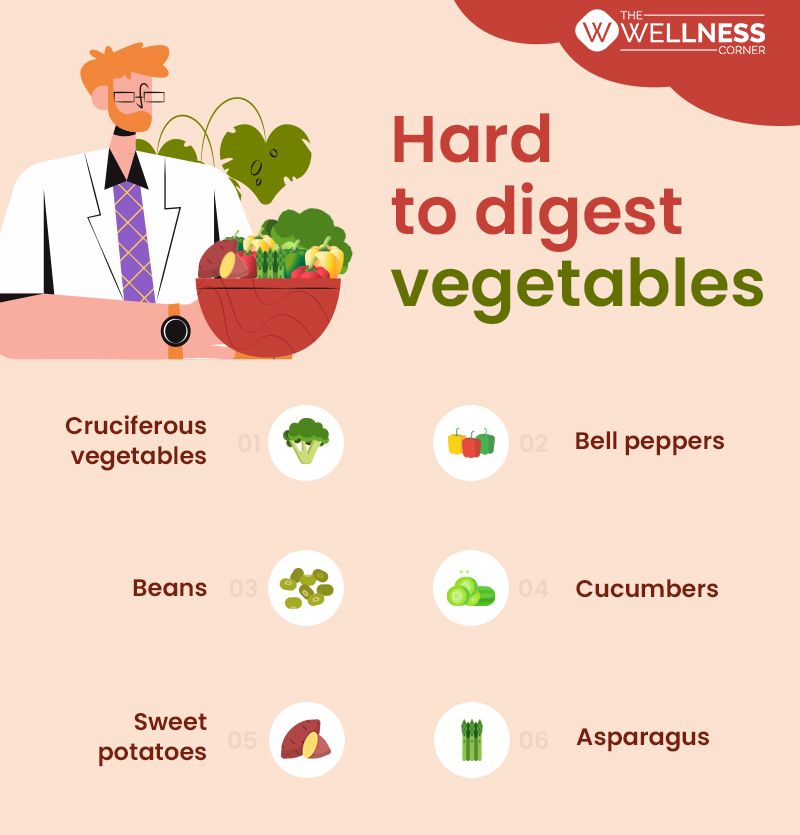Are vegetables causing disaster in your digestive system? While vegetables are hailed as nutritional powerhouses and essential components of a healthy diet, not everyone's gut is on friendly terms with these fibrous delights.
Finished a hearty salad loaded with vibrant greens, crunchy cucumbers, and colorful bell peppers, feeling virtuous and nourished. But soon after, your stomach starts rumbling, bloating sets in, and an orchestra of gurgles and gas ensues. What went wrong?
One of the primary culprits behind digestive distress from vegetables lies in their complex sugars, which can be challenging for some guts to break down. Cruciferous vegetables like broccoli, cauliflower, and Brussels sprouts contain compounds called raffinose and fructans, notorious for their gas-producing abilities. Your gut's resident bacteria have a field day fermenting these sugars, resulting in an unpleasant bloating symphony.
Also check: How to include fruits and vegetables in your diet?
But it's not just the gas that can cause trouble. For those with sensitive digestive systems, certain vegetables can be downright irritating. Onions, garlic, and peppers, beloved flavor enhancers, contain compounds that can inflame the digestive tract, leading to abdominal discomfort and pain. High-fiber vegetables, such as kale, cabbage, and asparagus, may also wreak havoc on sensitive guts, causing cramping and leaving you sprinting to the nearest bathroom.

Symptoms of gut struggle with vegetables
1 Bloating and gas
One of the primary ways your digestive system communicates its discomfort with vegetables is through bloating and excessive gas production. Cruciferous vegetables like broccoli, cauliflower, and Brussels sprouts contain complex sugars that are difficult to break down, leading to fermentation by gut bacteria and subsequent gas production. If you often experience bloating and excessive flatulence after eating vegetables, it may be a sign that your gut is struggling to digest them properly.
2 Abdominal discomfort and pain
Another way your digestive system may communicate its aversion to vegetables is through abdominal discomfort and pain. Certain vegetables, such as onions, garlic, and peppers, contain compounds that can irritate the digestive system, leading to inflammation and discomfort. Moreover, high-fiber vegetables like kale, cabbage, and asparagus can cause issues for individuals with sensitive guts, resulting in cramping and pain.
Must check: Can stress and anxiety lead to abdominal pain?
3 Diarrhea or constipation
If your digestive system is sensitive to vegetables, you may experience frequent diarrhea or constipation after consuming them. High-fiber vegetables, while beneficial for regularity in most people, can be overwhelming for those with a sensitive gut. Excessive fiber intake can lead to loose stools or worsen constipation if not balanced with adequate hydration.
Also check: Natural foods to boost healing
4 Acid reflux and heartburn
Acid reflux and heartburn can also be signs that your digestive system struggles with vegetables. Certain vegetables, such as tomatoes and citrus fruits, are highly acidic and can trigger these symptoms in susceptible individuals. Additionally, spicy vegetables like chili peppers can irritate the esophagus and worsen acid reflux.
Solution for gut struggles with vegetables
- Cook vegetables: Cooking vegetables can make them more digestible. Try steaming, boiling, sautéing, or roasting them instead of eating them raw.
- Gradual introduction: Introduce difficult-to-digest vegetables gradually and in small portions to allow your gut to adjust.
- Choose low-FODMAP vegetables: Opt for low-FODMAP options like carrots, zucchini, cucumbers, spinach, and green beans, which are generally better tolerated by sensitive guts.
- Experiment with different vegetables: Find out which vegetables work best for you by trying different types and observing your body's response.
- Monitor and identify triggers: Keep a food diary to track vegetable intake and symptoms to identify specific triggers.
- Opt for easily digestible vegetables: Include easily digestible vegetables such as steamed squash, sweet potatoes, and cooked leafy greens.
- Hydration and fiber balance: Ensure adequate hydration and maintain a balance of soluble and insoluble fiber to prevent digestive issues related to high-fiber intake.
Conclusion
Bloating, gas, abdominal discomfort, diarrhea or constipation, and acid reflux can all be signs that certain vegetables are not well-tolerated by your gut. By identifying these signals and making simple dietary adjustments, you can resolve these issues and still enjoy the benefits of a plant-based diet.
Remember to listen to your body and experiment with different cooking methods, low-FODMAP options, and low-acid vegetables to find what works best for your gut. It's essential to consult with a healthcare professional or dietitian for personalized advice and guidance.











